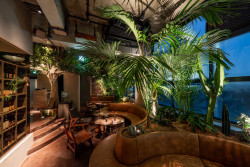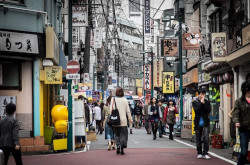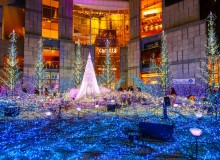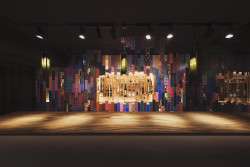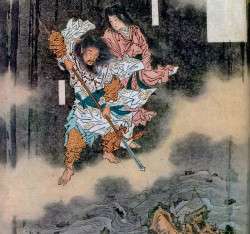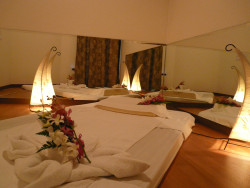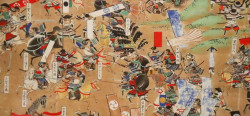
Originally published on metropolis.co.jp on June 2012

YOU CAN’T MAKE THIS S**T UP
- A group of hobbyists in Yokohama is reviving the once-popular Japanese pastime of honchi asobi, in which a pair of spiders are forced to fight each other.
- A junior high school teacher in Nagano apologized for taking a photo of one of his students, projecting it on a classroom TV, and declaring “I’ll execute you!”
- Kanagawa police say the owners of a bar in Yokohama called Sexy Izakaya Fujiko-chan ordered a 16-year-old waitress to work “in underwear and bikinis.”
- A team of Japanese researchers claim that stress from the March 11 disaster is causing survivors’ brains to “shrink.”
POLITICS UNUSUAL
- Officials in a small town in northern New Jersey were visited—twice—by delegations of Japanese diplomats urging them to remove a public monument commemorating “women who were forced into sexual slavery by Japanese soldiers during World War II.”
- Private railways and bus companies in Japan are beginning to grumble about the decades-long tradition of providing free rides to members of the Diet. They say it’s getting increasingly difficult “to secure understanding from [ordinary] users.”
- US President Barack Obama is said to have presented a birthday cake to Prime Minister Yoshihiko Noda at last month’s G8 summit in Maryland. Noda turned 55 during the weekend of the meeting.
- Back in Japan, the PM held talks with the leaders of three Pacific island states. Micronesia’s president offered Noda “two palm ropes as a token of friendship.”
SOMETHING IN THE AIR
- Researchers in Japan and the US say the sun might be susceptible to a phenomenon called a superflare, which has the potential to “cause power outages on a global scale.”
- The Japan Meteorological Agency is blaming its inability to predict tornados on the fact that Japanese twisters are “generally small.” In 2008, the accuracy rate of the agency’s tornado forecasts stood at 9 percent; last year, it was 1 percent.
- The lower house of the Diet has banned smoking in its cafeteria out of concerns that “the center of national politics lags behind international standards.”
- Officials at Central Japan International Airport near Nagoya have unveiled a betting salon for travelers to wager on kyotei boat races. The service, which specifically targets foreigners, is being described as the “first betting station at an airport for a publicly operated racing event.” We don’t dispute that claim.
HAIL THE CONQUERING HEROES
- Kota Morinishi, a 23-year-old University of Tokyo graduate, beat 50 competitors from 14 countries to take the crown at last month’s Beijing International Sudoku Tournament.
- A Japanese composer living in Paris was awarded the Queen Elizabeth International Grand Prize for Composition—the first time in 35 years a Japanese national won the title.
- The Japanese government gave a cherry tree sapling to the Boston Red Sox as a gesture of thanks for the team’s fundraising support following the March 11 disaster.
PUBLIC NUISANCES
- The Metropolitan Police Department is getting rid of more than 10,000 bicycle lanes at intersections in Tokyo in an effort “to discourage cyclists from riding on sidewalks.”
- JR East is embarking on a project to remove graffiti from about 100 places along the Yamanote line, mostly near Shibuya and Harajuku stations. The scrawls will be covered over with a glossy substance “that promotes fast and easy removal of graffiti and adhesives.”
- The railway has also debuted a nifty energy-saving system in which the power generated by a train’s brakes is stored in batteries and “fed to nearby trains.”
- The top executive of a trading company in Nagoya was arrested, along with his wife and son, for exporting two used Mercedes-Benz cars to North Korea. The transaction violated Japanese laws banning trade with Pyongyang.
AND THE SURVEY SAYS…
- A nationwide poll of elementary school students reveals that 23 percent of the country’s fifth graders own mobile phones, a 3 percent rise from last year.
- A public-opinion survey commissioned by the foreign ministry found that most US citizens consider Japan to be their most important ally in Asia. American “opinion leaders,” however, believe the US is closer to China.
- For the 21st consecutive year, Japan led all nations in terms of net external assets in 2011, with ¥253 trillion. China is second at ¥138 trillion.
- The health ministry says the number of households receiving welfare has reached a record high of 1.52 million.
NICE MELONS
- A pair of melons from the famed growing region of Yubari in Hokkaido fetched a cool ¥1 million at the traditional spring auction. That’s impressive, to be sure, but still shy of the ¥2.5 million that someone paid at an auction in 2008.
- Tour groups from the Chinese mainland have returned to Fukushima for the first time since the March 11 disaster.
- At a recent academic conference in Seoul, Japanese and South Korean scholars urged the administration of President Lee Myung-bak to overturn a law banning the broadcast of Japanese TV shows.
- Bottom Story of the Week: “Japanese Team to Use Deep-sea Submersible to Observe Eels’ Spawning” (via Kyodo)
Compiled from reports by AP, Japan Today, The Japan Times, The Asahi Shimbun, The Tokyo Reporter, Japan Probe, The Mainichi Daily News, Daily Yomiuri, AFP, Reuters and Kyodo.
